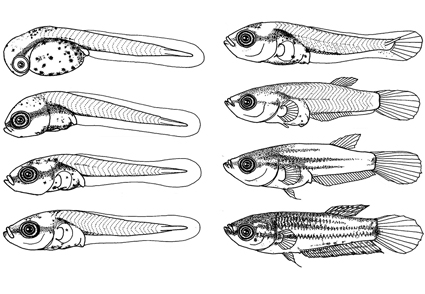Abstract
The morphology of larvae of five bubble-nesting Betta species (B. imbellis, B. mahachaiensis, B. siamorientalis, B. smaragdina, and B. splendens) from Thailand was described from specimens reared in the laboratory from wild-caught parents. For all species, the mean notochord length (NL) of the larvae ranged from 2.37 to 2.58 mm. Larvae reached the flexion stage within 9–15 days (NL = 3.22–5.21 mm) and the juvenile stage within 40–45 days (standard length = 10.45–12.18 mm). The main characteristics of hatched larvae for all species were an oblong and slightly compressed body, a small and rounded head, an oval to rounded eye, and a yolk sac without oil droplets. Pre-flexion larvae for all species have an oblique, terminal mouth, and pectoral buds begin to develop after day 1. During the post-flexion larval stage, rays for the caudal, dorsal, anal, ventral, and pectoral fins begin to develop. Juveniles have a fully developed ventral fin with 2–3 dorsal, central, and ventral stripes, and a caudal spot. The minimal and maximal myomere number and fin rays differed between species. For all species, there were 1–2 dorsal spines, 7–9 dorsal rays, 9–12 pectoral rays, 1 ventral spine, 4–5 ventral rays, 2–4 anal spines, 22–28 anal rays, and 10–12 caudal rays. The different larval stages also differed in pigmentation patterns between species. Pigmentation patterns on the head (pre-orbital, sub-orbital, post-orbital, and sub-opercular bars) and longitudinal stripes on the side of the body could be used to distinguish between different larval stages as well as different species.
References
Adewumi, A.A. (2018) The impact of nutrition on fish development, growth and health. International Journal of Scientific Research Publication, 8 (6), 147–153. https://doi.org/10.29322/IJSRP.8.6.2018.p7822
Balon, E.K. (1985) Early life histories of fishes: New developmental, ecological and evolutionary perspectives. Dr W. Junk Publishers, Boston, Massachusetts, 280 pp. https://doi.org/10.1007/978-94-010-9258-6
Chaichana, R., Poungcharean, S. & Yoonphand, R. (2011) Habitat, abundance and diet of invasive suckermouth armored catfish (Loricariidae Pterygoplichthys) in the Nong Yai Canal, East Thailand. Tropical Zoology, 24, 49–62.
Department of Fisheries (2018) The statistics of import-export aquatic animals by Suvarnabhomi Airport. Fish Quarantine-Suvarnabhumi International Airport, Department of Fisheries, s.n. [unknown pagination, in Thai]
Monvises, A., Nuangsaeng, B., Sriwattanarothai, N. & Panijpan, B. (2009) The Siamese fighting fish: Well-known generally but little-known scientifically. Science Asia, 25, 8–16. https://doi.org/10.2306/scienceasia1513-1874.2009.35.008
Korwin-Kossakowski, M. (2008) The influence of temperature during the embryonic period on larval growth and development in carp, Cyprinus carpio L., and grass carp, Ctenoppharyngodon idella (Val.): Theoretical and practical aspects. Archives of Polish Fisheries, 16, 231–314. https://doi.org/10.2478/s10086-008-0020-6
Kottelat, M. & Ng, P.L.K. (1994) Diagnostics of five new species of fighting fishes from Banga and Borneo (Teleost: Belontiidae). Ichthyological Exploration of Freshwaters, 5, 65–78.
Kowasupat, C., Panijpan, B., Ruenwongsa, P. & Jeenthong, T. (2012) Betta siamorientalis, a new species of bubble-nest building fighting fish (Teleostei: Osphronemidae) from eastern Thailand. Vertebrate Zoology, 62, 387–397.
Leis, J.M. & Carson-Ewart, M. (2000) The larvae of Indo-Pacific coastal fishes: An identification guide to marine fish larvae. Brill, Leiden and Boston, Massachusetts, XIX + 850 pp. https://doi.org/10.1163/9789004474857
Neira, F.J., Miskiewicz, A.G. & Trnski, T. (1998) Larvae of temperate Australian fishes: laboratory guide for larval fish identification. UWA Publishing, Crawley, xix + 474 pp.
Panijpan, B., Sriwattanarothai, N., Kowasupat, C., Ruenwongsa, P., Jeethong, T. & Phumchoosri, A. (2017) Biodiversity of bubble-nest building and mouth-brooding fighting fish species of the genus Betta in Southeast Asia. The Thailand Natural History Museum Journal, 11 (1), 1–21.
Ritcher, J. (1981) Einführung eines neuen Gattungs names für die manulbrütenden Kampffischeunter becsonderrer Betrachting von Pseudobetta pugnax (Cantor, 1849). Aquarien Terrarien, 28, 272–275.
Roberts, T.R. (1989) The freshwater fishes of western Borneo (Kalmantan Barat, Indonesia). Memoirs of the California Academy of Sciences, 14, 1–210.
Rønnestad, I. & Morais, S. (2008) Digestion. In: Finn, R.N. & Kapoor, B.G. (Eds.), Fish Larval Physiology. Science Publishers, Enfield, New Hampshire, pp. 201–262. https://doi.org/10.1201/9780429061608-11
Rüber, L., Britz, R., Tan, H.H., Ng, P.K.L. & Zardora, R. (2004) Evolution of mouthbrooding and life-histories correlates in the fighting fish genus Betta. Evolution, 58, 799–813. https://doi.org/10.1111/j.0014-3820.2004.tb00413.x
Schindler, I. & Schmidt, J. (2006) Review of the mouthbrooding betta (Teleostei, Osphronemidae) from Thailand, with description of two new species. Zeitschrift für Fischkunde, Bd. 8, Heft 1/2, 47–69.
Sriwattanarothai, N., Steinke, D., Ruenwongsa, P., Hanner, R. & Panijan, B. (2010) Molecular and morphological evidence supports the species status of the Mahachai fighter Betta sp. Mahachai and reveals new species of Betta from Thailand. Journal of Fish Biology, 77, 414–424. https://doi.org/10.1111/j.1095-8649.2010.02715.x
Tan, H.H. (1998) Two new species of the Betta waseri group (Teleostei: Osphronemidae) from central Sumatra and southern Thailand. Ichthyological Exploration of Freshwaters, 8, 281–287.
Termvidchakorn, A. (2005) Freshwater fish larvae in Thailand II. Inland Fisheries Resources Research and Development Institute, Inland Fisheries Resources Research and Development Bureau, Department of Fisheries, Bangkok. [unknown pagination, in Thai]
Termvidchakorn, A. & Hortle, K.G. (2013) A guide to larvae and juveniles of some common fish species from the Mekong River Basin. MRC Technical Paper No. 38. Mekong River Commission, Phnom Penh, pp.
Viseth, H., Kinoshita, Y., Akishinonomiya, F., Taki, Y. & Kohno, H. (2013) Morphological development of hatchery-reared larval and juvenile Pangasius bocourti. Natural History Bulletin of the Siam Society, 59, 137–148.
Welcomme, R. & Vidthayanon, C. (2003) The impacts of introductions and stocking of exotic species in the Mekong Basin and policies for their control. MRC Technical Paper No. 9. Mekong River Commission, Phnom Penh, Cam, 38 pp.


